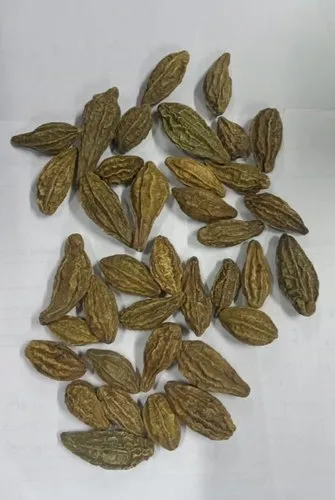Harad Fruit – Haritaki – Terminalia Chebula – Harra – Kabuli Harad
₹22.0
Product Details:
| Minimum Order Quantity | 50 Kg |
| Packaging Size | As Per Customer Specifications |
| Form | Solid |
| Packaging Type | Plastic Bag |
| Botanical Name | Terminalia Chebula |
| Dried | Yes |
| Is It Dried | Dried |
| Grade | Medicinal |
| Purity | 100% |
| Usage/Application | Medicinal |
| Brand | Sinhal |
| Natural | Yes |
- Description
- Additional information
- Reviews (0)
- Q & A
- Sustainability Remark
- More Offers
- Store Policies
- Inquiries
Haritaki fruit is one among The three, that constitute Triphala. It is a very famous rejuvenating herb. Its botanical name is Terminalia chebula and it belongs to Combretaceae family.
- Hindi name – Harad, Harade
- English name – Chebulic Myrobalan
- Telugu name – karakkaya
- Tamil name – Kadukkai
- Gujarathi name – Harade
- Arabian name – Haleelaz
- Farsi name – Haleel
- Kannada name – Alale Kayi
| brands | Sinhal |
|---|
You must be logged in to post a review.
Q & A
The sustainability of organic herbal fruits can depend on several factors, including the farming practices used to grow the fruits, the environmental conditions in the region where they are grown, and the demand for these fruits in the market.
Organic farming practices are generally considered to be more sustainable than conventional farming practices because they prioritize soil health, biodiversity, and natural pest control methods. Organic farmers also tend to use fewer synthetic pesticides and fertilizers, which can reduce the risk of soil and water pollution.
In terms of environmental conditions, the sustainability of organic herbal fruits can depend on the availability of water, sunlight, and nutrients, as well as the climate and soil type in the region where they are grown. Some herbal fruits may also require specific growing conditions, such as a certain temperature range or soil pH, which can impact their sustainability.
Finally, the demand for organic herbal fruits can also impact their sustainability. If there is a high demand for these fruits, farmers may be more likely to prioritize quantity over quality or may resort to unsustainable farming practices to meet demand. However, if there is a moderate demand for these fruits, farmers may be able to prioritize sustainability and quality over quantity.
Overall, the sustainability of organic herbal fruits can vary depending on several factors, and it is important to consider these factors when evaluating the sustainability of specific fruits or farming practices.
General Inquiries
There are no inquiries yet.





Reviews
There are no reviews yet.